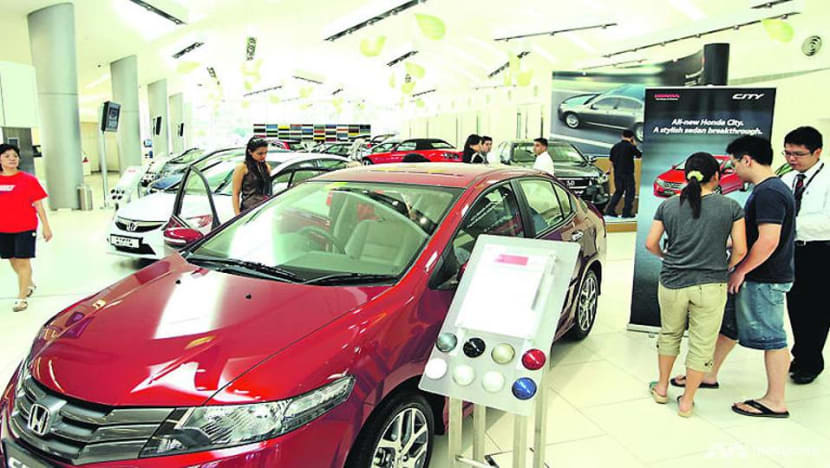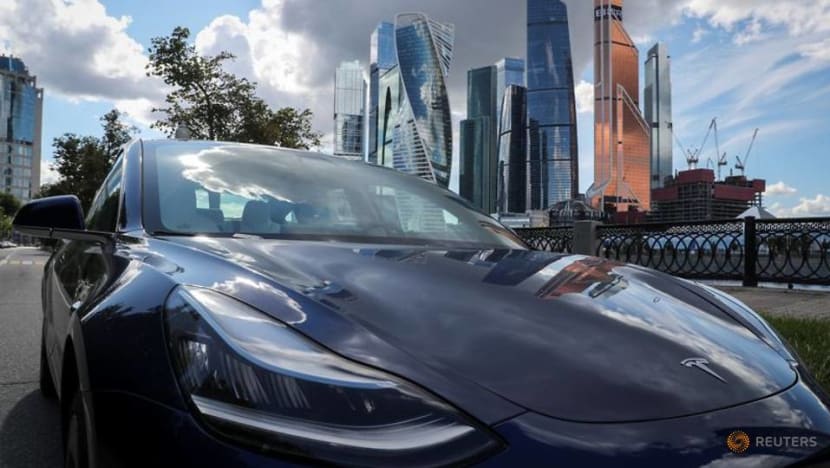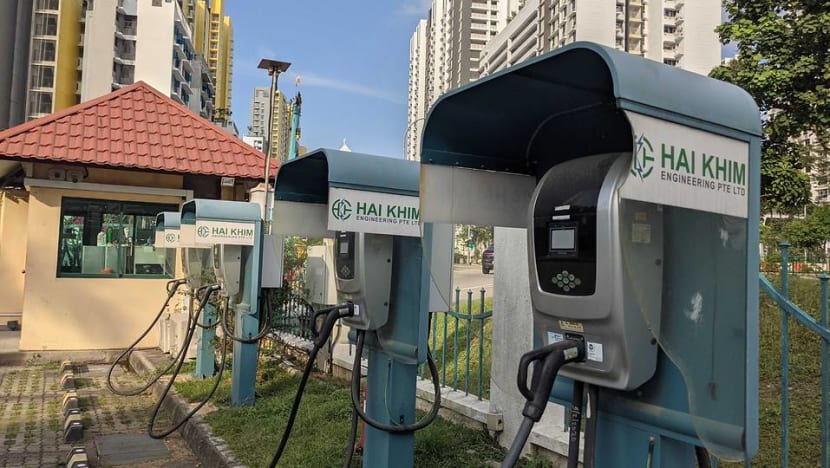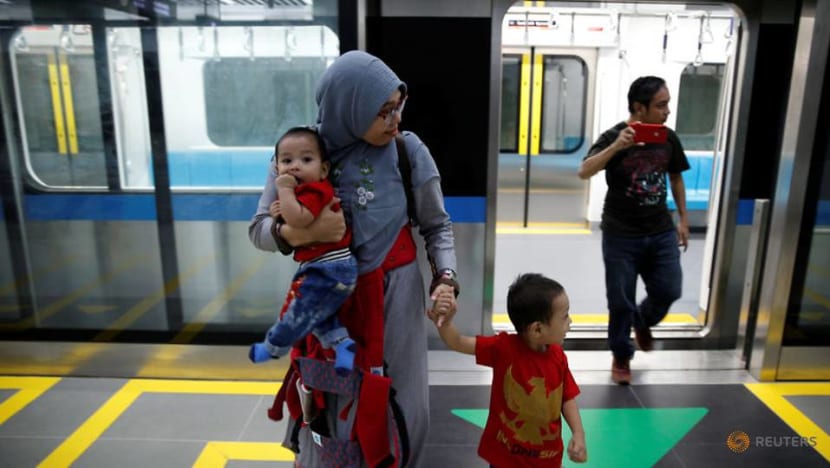commentary Commentary
Commentary: Giving up petrol cars is a lot more difficult for parents
To help Singapore be car-lite, more needs to be done to nudge parents towards giving up their cars. But that might be an impossible ask for some.

File picture of a car in a showroom. (File Photo: TODAY)
SINGAPORE: Owning a car is not just a superficial pursuit, but a convenience and, I dare say, a necessity for some.
As a parent of three kids aged five and younger, I couldn’t agree more.
Sending them to preschool and then picking them up – sometimes with short intervals between the drop-off and pick-ups, as well as various other activities – is our lived reality.
READ: Commentary: Why I will probably never own a car – not even an eco-friendly one
There’s also the twice weekly drop-off and pick-up to and from the grandparents’ place – all the more significant since work-from-home started last year - giving us working professionals at least two quiet days a week to be productive at home.
Parents of young children will appreciate the complexity of the logistics involved. Coordinating and manoeuvring your kids’ schedules is almost a full-time job but thankfully one made easier by owning our own car.
PUSH FOR EVs
It seems a little strange and out-of-touch to talk about car ownership when the country is on the cusp of an electric vehicle wave.
Earlier this month, the Government launched the Singapore Green Plan 2030 and announced that it will revise Singapore’s vehicle tax structure to make it easier to buy and own electric vehicles (EVs). Local banks DBS and OCBC also rolled out support for the usage of EVs.
In his Budget speech on Feb 16, Deputy Prime Minister Heng Swee Keat announced S$30 million to be set aside over the next five years for EV-related initiatives. This, after the Green Plan 2030 announced a fresh target of 60,000 charging points across the island by 2030.
The Finance Minister also shared efforts to make EVs affordable locally – by lowering the Additional Registration Fee floor to zero and by adjusting road tax bands.
In addition, he also raised petrol duty rates by 15 cents per litre for premium petrol and 10 cents per litre for intermediate petrol.
It is clear the Government is trying to promote cleaner private transport use, which Mr Heng said will result in the reduction of 24 kilo-tonnes of carbon dioxide emissions.
WHY NOT EVs YET?
Don’t get me wrong. I am not at odds with this national goal. Nor am I disinterested in contributing to cleaner private transport. It is an important and commendable pursuit.

But it isn’t a straightforward binary choice between buying an EV and a regular petrol car. There are many considerations.
For one, pricing – which will be a key determinant to anyone considering the switch.
Before this month, Tesla’s entry-level Standard Plus Model 3 EV was only available through parallel importers at a price of around S$259,000. That was not a price that had me rushing to the showrooms to make a booking.
READ: Commentary: Impact of petrol duty hike goes beyond immediate effect on cost of living
In February, Tesla launched its direct sales portal for Singapore where the Standard Plus Model 3 will now be retailed between S$112,845 to S$158,334 depending on the variant chosen. Other available EVs, such the Hyundai Ioniq Electric, currently costs more than S$150,000 here.
That is much better but bearing in mind that these prices exclude COE.
For that price range, I can purchase a much more spacious seven-seater car – such as a Mazda CX-8, Mitsubishi Outlander, Toyota Prius Alpha Hybrid and a Peugeot 5008 – that is much better-suited to my family of seven.
Then there’s also the availability of charging infrastructure. That’s currently inadequate.
If I was driving a petrol-fuelled car and my vehicle was dangerously running out of fuel, there would be more than 150 petrol stations conveniently located across the island I could pull up at to refuel.
If I was driving an EV and my battery was reaching dangerously low levels, would I have the same access to charging points to help me get on my journey?
Looking at the announcements in the Budget speech, perhaps this infrastructure will be available in the future. But for now, I am not risking my car stalling mid-journey with three crying kids in it.
Moreover, on charging, fixing a charging point in one’s home is also an additional outlay cost. Although there may be loans for it and some EV companies do provide this service for a low or no cost, it’s still a cost I have to bear in driving an EV.
WILL IT MOVE THE NEEDLE?
I will consider switching to an EV, perhaps when buying one becomes more reasonable.
Perhaps when car models to suit larger families such as mine, along with the charging infrastructure, are more readily available, with the cost of installing such points in my home low or negligible.
A removal of COEs on EVs for instance, would most definitely nudge me to make the switch.

Yet, switching to EVs may only make a small dent in Singapore’s emissions levels. As Mr Heng alluded to, the ultimate aim is “to go car-lite” but switching to cleaner-energy vehicles along the way will help Singapore “further reduce emissions”.
To move the needle in Singapore’s land transport emissions, car ownership must drop. But as a parent and car owner, this vision to get most of us to give up owning a car is easier said than done and is perhaps a very long-term proposition.
What would the alternatives be? Using public transport has its challenges for those in our situation.
READ: Commentary: Don’t be too quick to write off the sharing economy, even with COVID-19
READ: Commentary: A Gojek-Tokopedia merger has ramifications for regional unicorns including Grab and Sea
Even if we were brave enough to manage three young kids on our own in a crowded SMRT train or bus - assuming the other was occupied with work commitments - there is also the accessibility issue.
The nearest MRT station to my house is about 10 to 15 minutes away while the nearest bus stop has only one bus service taking us to the MRT station.
I know many parents do this regularly, but it is honestly an arduous task.
The next option is to take a private-hire vehicle. Parents will know that for passengers with children, the GrabFamily option only has provision for one child. What does someone like me with three kids do except carry along my own additional booster seats – not always a feasible choice.
If there was an option to book for more child passengers I would gladly do so even though I cannot discount the extra expenses this will incur – an estimated S$5 more per ride on a GrabFamily from my house in Changi to town. Taking a regular taxi will cost just as much.

Based on my family’s projected usage, that works out to a sizable increase per month of between S$200 to S$300. My total spend on ride-hailing services per month will thus make owning a car a rather economic proposition.
So it is not just about the logistical challenges of moving the family out and about while lugging additional booster seats along with other packed necessities and more.
THE ECONOMICS OF IT
Yet owning a car may be more expensive.
Car instalments, road tax, petrol, parking and insurance on a modest car could set one back by about S$1,300 to S$1,400 in a month.
Based on my estimates, if my family took Grab everywhere we went, we would spend between S$1,100 to S$1,200 per month, based on travelling to and from 10 destinations per week.
With the economics of owning a car only slightly more from regularly taking a cab - other considerations come into play.
Weighed against the convenience and comfort of hopping into my car, belting my kids safely up and dropping them off at their destination within a reasonably short time and with barely a drop of sweat falling from my brow, it is an easy choice.

But like many others, I too believe in the vision and importance of a car-lite society, and would one day feel more confident contributing towards it – perhaps when the MRT lines expand and bus services improve as promised.
By then, my children will be a lot older, more independent and perhaps detest the thought of being ferried around by their parents. That will make it easier for us to give up the car.
For now, we are glad we have a car – even if it’s not one operating on “clean” fuel and with petrol prices going up.
We will find other ways to save money and the environment – maybe using less air-conditioning and being more mindful of our expenditure on utilities.
LISTEN: A labour MP, a business community leader and an economist break down the shifts underway in Singapore's Budget 2021 on CNA's Heart of the Matter podcast:
SIGN UP: For CNA’s Commentary weekly newsletter to explore issues beyond the headlines
Malminderjit Singh is editor at CNA Digital News, Commentary section.














